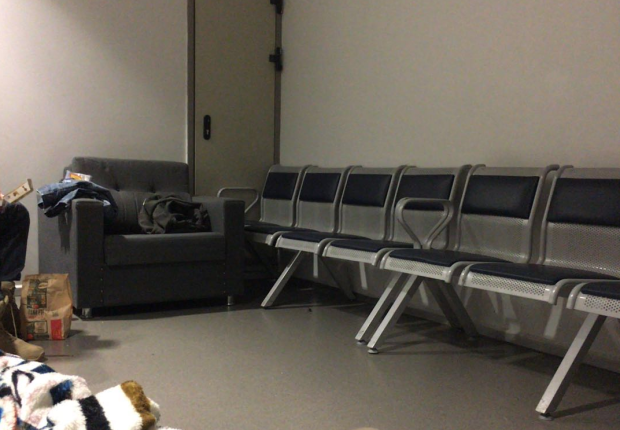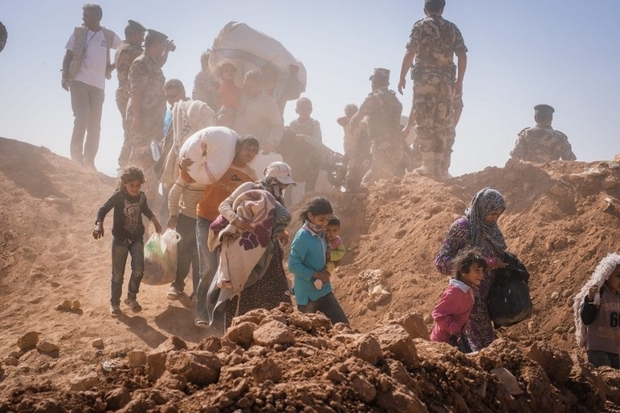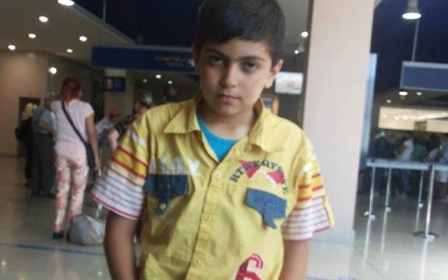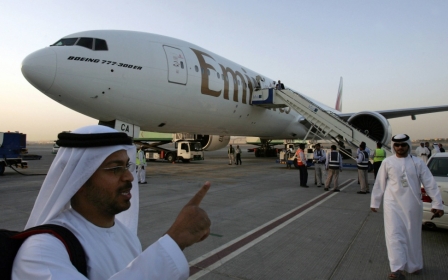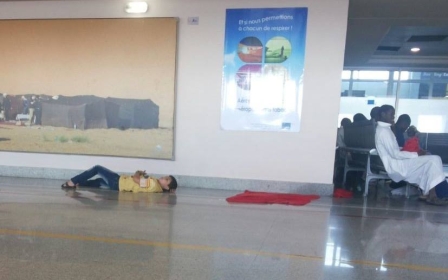Syrian describes months of 'psychological torture' in Turkish airport detention
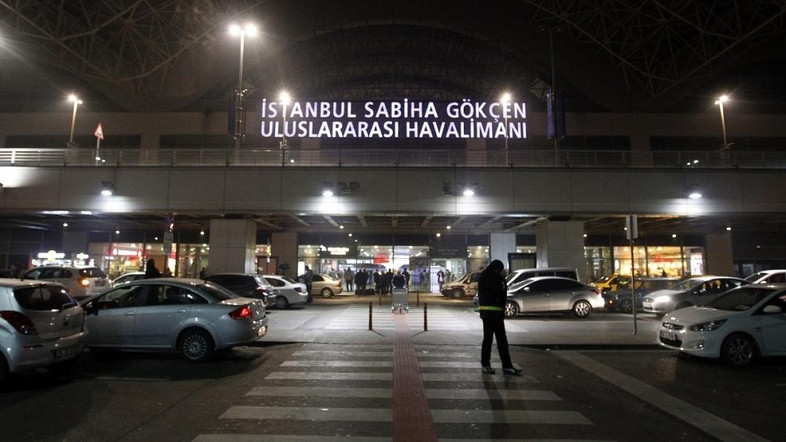
A Syrian asylum seeker says he has faced "psychological torture" as he described being held for more than four months in a room at a Turkish airport.
Fares has been held in a locked room at Istanbul’s Sabiha Gokcen airport since his plane touched down from Jordan in November.
This week he spoke by phone to Middle East Eye about his experience, as a second Syrian asylum seeker marked a year since he was first held at another airport outside Istanbul.
“It has been very, very hard these past four months,” said Fares, who asked that his real name not be used to protect family still living in Syria.
“There is no natural daylight, and the artificial light is never turned off. The light is right above my head which makes it almost impossible to sleep.
“I am locked in this room for 24 hours a day. I have emailed asylum applications to the US, the UK and Canada but they all say I don’t meet their requirements.
“They don’t see me as a person. And now I’m stuck in prison for no reason.”
Fares, 28, flew to Istanbul in November hoping to claim asylum and be reunited with his 12-year-old twin sisters, whom he hadn’t seen for more four years.
In 2011 the peaceful protests in his southern Syrian hometown of Deraa turned to bloodshed, when the government began the brutal crackdown that would lead the country from Arab Spring-style uprising to bloody civil war.
Fearing forcible conscription into the armed forces, he fled to Jordan and worked as an engineer without a permit.
More than 620,000 Syrians are registered as refugees in Jordan, but strict requirements aimed at keeping national unemployment figures down mean that only a small percentage of them have managed to obtain permits to work legally.
Life “in the shadows”, as he describes it, was tough – he struggled to access healthcare and was at constant risk of deportation.
For his sisters still in Syria, though, the struggle was even harder. Their mother was killed in 2011, and their father went missing in the same year – he has not been seen since.
Last November, after four years being looked after by a family friend, the twins travelled to Jordan hoping to be reunited with Fares.
But when they touched down they were refused entry to Jordan, and flown back to Syria on the same plane they arrived on.
Unable to meet in Jordan, the family agreed to travel separately to Turkey – and when Fares left the country, he says he had to sign a declaration that he would never return.
“In Jordan they force every Syrian citizen leaving the country to sign a piece of paper saying they are banned for life, and acknowledging that if they return they will be sent back to Syria,” Fares said.
Jordan’s Interior Ministry, the body responsible for migration issues, has not responded to MEE’s requests for comment, and we were not able to verify these allegations.
Jordan has been praised for hosting hundreds of thousands of Syrians fleeing the chaos across the border, but has also faced criticism from rights groups who say it has broken international law by forcibly deporting asylum seekers back to the war-torn country.
According to Turkish asylum law, though, Jordan is a “safe country” - so when Fares arrived in Turkey and applied for asylum there he was rejected almost immediately.
“I am forbidden from entering Jordan for the rest of my life – I told [the Turkish authorities] that if they send me back there I will be returned to Syria, where I will be killed.”
Now, after being trapped in legal limbo for months following a failed attempt to deport him to Jordan back in November, Fares says he feels shock at the way he has been treated.
“I expected this to last three days at most. But now I’ve been here for four months and eight days, eating the same food every day. Meat, chips and salad, every single day.”
Amnesty International, which has campaigned on Fares’s behalf, says his continued detention constitutes ill treatment, which may raise further questions over whether Turkey can be considered a “safe country” under EU law.
“It is shocking,” says Anna Shea, an adviser on refugee and migrant rights for Amnesty International.
“These conditions might be fine for a few hours – but when you’re kept like this for months and months it constitutes ill treatment.”
Turkish authorities have not responded to requests for comment on Fares' situation.
People entering Turkey to seek asylum now run the risk of being imprisoned indefinitely in holding rooms like the one Fares has spent four months in, thanks to a court ruling last June.
Detention in airport facilities is now considered technically different from immigration detention, which according to Turkish law cannot be extended beyond a year.
The ruling was bad news for Fadi Mansour, the Syrian asylum seeker who on Tuesday marked a year since he was detained at Istanbul’s Ataturk Airport on 15 March 2015.
Under Turkish asylum law, he should have been released by Tuesday – but since the normal rules no longer apply to people detained in airport holding rooms, he now has no idea when he could be released.
“Detention is a question of fact – if you can choose whether to leave or not,” says Shea.
“And if the choice you’re given is between going back to a place where you might be killed or tortured, and being detained indefinitely, then that’s not really a choice. That’s detention."
Amnesty has raised questions over whether Turkey can rightly be considered a “safe country” – one to which Europe can legally return asylum seekers.
“We have to recognise that Turkey is currently hosting millions of non-nationals. Compared to other countries, Turkey’s treatment of asylum seekers is much better,” says Shea.
“But there is very convincing proof from last December that Turkey has deported people back to Syria and Iraq after illegally detaining them. Based on this we have serious doubts about whether Turkey can be considered a safe country.”
Fares says it is a “mistake” for Europe to seek to return large numbers of asylum seekers to Turkey, for example through the controversial “one in, one out” scheme.
The proposal would mean that a Syrian who arrives on the Greek islands after a risky sea crossing would be automatically returned to Turkey without having their asylum claim heard, in exchange for one Syrian living in Turkey being given safe passage to Europe.
Amnesty has condemned the scheme as "dehumanising”, saying it risks sending more asylum seekers back to perilous conditions in Turkey, which is not a full signatory to the landmark 1951 Refugee Convention.
Fares says his situation highlights the dangers Syrian asylum seekers face when they are shunted from pillar to post.
“Where are we meant to go? Syria is broken.
“All I want now is to live in any country but there – and even after all this imprisonment and psychological torture I’d be happy for that country to be Turkey.
“I just want to live with my sisters in a safe home.”
New MEE newsletter: Jerusalem Dispatch
Sign up to get the latest insights and analysis on Israel-Palestine, alongside Turkey Unpacked and other MEE newsletters
Middle East Eye delivers independent and unrivalled coverage and analysis of the Middle East, North Africa and beyond. To learn more about republishing this content and the associated fees, please fill out this form. More about MEE can be found here.


